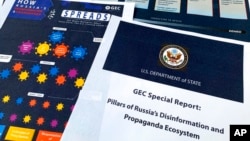On September 4, the U.S. departments of Justice and State announced sanctions and criminal charges against two RT employees for allegedly laundering $10 million to spread Russian propaganda through U.S. influencers, aiming to influence the November 2024 election.
The Department of Treasury also designated 10 people and 2 entities in response to Russian influence efforts.
On the same day, Leonid Slutsky, head of the Russian State Duma's international affairs committee, labeled the U.S. sanctions against RT as a "witch hunt," claiming they are an attack on freedom of speech and an example of vulgar censorship:
"U.S. sanctions against the media group Rossiya Segodnya, RIA Novosti, RT and Sputnik are a clear example of a ‘witch hunt,’ pressure on freedom of speech and vulgar censorship. The adherents of the ‘empire of lies’ are waging war on everyone who speaks the truth about the policies of modern neocolonialists."
This statement is false.
The U.S. Justice Department unsealed an indictment charging Russian nationals RT employees with violating the Foreign Agents Registration Act (FARA) and money laundering. They are accused of orchestrating a $10 million scheme to covertly spread disinformation in the U.S. via a front company, while falsely claiming it was backed by a private investor.
The Department of State has imposed new visa restrictions and designated Rossiya Segodnya and its subsidiaries as Foreign Missions. The Treasury Department also sanctioned 10 individuals, including RT Editor-in-Chief Margarita Simonyan, for their roles in the covert influence campaign.
Justice Department charges
On September 4, a federal indictment was unsealed in the Southern District of New York, charging Russian nationals Kostiantyn Kalashnikov, 31, and Elena Afanasyeva, 27, with conspiracy to violate FARA and money laundering. Both are currently at large.
According to Attorney General Merrick Garland, the indictment alleges that Kalashnikov and Afanasyeva, employees of the Russian state-controlled media outlet RT, orchestrated a $10 million scheme to covertly disseminate pro-Kremlin propaganda or disinformation in the U.S. Many of the videos produced by the company aligned with Russia's objective of deepening U.S. domestic divisions, with the apparent goal of weakening American opposition to Russia's core interests, particularly its ongoing war in Ukraine.
A Tennessee-based company concealed its connections to RT and the Russian government from both influencers and their millions of followers. Instead, the defendants falsely claimed that the company was backed by a private investor, who was, in fact, a fictitious person.
Deputy Attorney General Lisa Monaco emphasized the U.S. approach to countering foreign influence, stating that RT and its employees funneled nearly $10 million to online commentators to spread pro-Russia propaganda. She affirmed the Department’s commitment to preventing illegal foreign manipulation of American public opinion.
Kalashnikov and Afanasyeva face charges that carry maximum sentences of 25 years in prison. The FBI is investigating the case.





